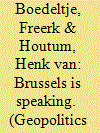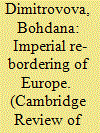|
|
|
Sort Order |
|
|
|
Items / Page
|
|
|
|
|
|
|
| Srl | Item |
| 1 |
ID:
103745


|
|
|
|
|
| Publication |
2011.
|
| Summary/Abstract |
What would a non-Eurocentric European Neighbourhood Policy (ENP) look like? Starting off with this perhaps "impossible" question, the first half of the article traces recent shifts in thinking about ENP on the part of EU administrators and intellectuals who argue for a strengthened and reinvigorated neighbourhood policy around the Southern Mediterranean, Middle East and CIS countries, through what has now been termed a differentiated "ENP plus". Parsing recent EU reports, opinions and speeches, it isolates a crucial ambiguity within this re-framed policy landscape regarding ENP's relationship to the previous round of EU expansion, which has important political consequences for how ENP currently envisions the thorny problem of transition within the neighbourhood. The second half of the article draws on a parable by the Argentinean novelist-philosopher Jorge Luis Borges to frame more sharply the problem of cartographic representation embedded within ENP. Applying the neologism of a "Borgesian frontier" to the space of the European Neighbourhood, the paper concludes by suggesting some potential pathways for re-imagining this space in ways that work along with, rather than are "blind" to, contradictions inherent to Europe's newly minted external borderland. At stake, the article argues, is a politics that can properly re-envision regions of the world located at the limits of Europe's sovereign spatial imagination.
|
|
|
|
|
|
|
|
|
|
|
|
|
|
|
|
| 2 |
ID:
103739


|
|
|
|
|
| Publication |
2011.
|
| Summary/Abstract |
The European Neighbourhood Policy (ENP) was presented as the EU's strategic response in order to deal with the new situation following the enlargement of the European Union in 2004. According to the EU, these changing circumstances have led to new rationales: 1) coping with its new external borders and neighbours and 2), finding a solution for a further enlargement problem. Both rationales are drawn out of strategic interest avoiding potentially damaging consequences on stability and development. Moreover, new inducements for multilevel cooperation were seen as necessary in order to 'include' the neighbouring states and create a prosperous and stable 'Ring of friends'. The ENP has the objective to contribute to internal transformation and to further the process of 'Europeanisation'. Europeanisation is explained by the EU as a normative process of sharing European values made concrete through policies of conditionality and socialisation of neighbouring states. This process of expanding 'Europeanisation' beyond the EU borders is inspired by an ambiguous and conflicting geopolitics that the EU applies as a strategic instrument. Most notably, this is emphasised by the fact that the ENP on the one hand creates an image of an inferior neighbour that urgently needs to move towards European standards and on the other hand produces a speech politics of mutuality and dialogue.
Through the study of EU speeches, communications and documents, we will argue that the rationales behind the ENP suggest a closure of the European Union and allow for neo-colonial interpretations by which pre-defined policies are to be accepted and pre-defined European values are seen as superior to neighbouring local values. This development is both undesirable and harmful. Europe is increasingly re-created as a bounded political entity institutionalised through hierarchical treaties and acts with friends, special friends, and reluctant, unwilling neighbours. In doing so, the EU faces a significant chance of alienating its neighbours and damaging cultures and societies by asymmetrical imperial power-policies based on self-created values. Paradoxically then, ENP that was set up to create good neighbours, risks producing what it wishes to protect from, angry neighbours.
|
|
|
|
|
|
|
|
|
|
|
|
|
|
|
|
| 3 |
ID:
115979


|
|
|
|
|
| Publication |
2012.
|
| Summary/Abstract |
Debates on the European Neighbourhood Policy (ENP) pivot on questions about what kind of political community the EU is becoming and what are the limits of its power projections in the EU's Neighbourhood. Indeed, with this new ambitious and ambiguous policy the EU's external relations are expanding from purely economic to cultural, political and security functions. The EU's desire and need to export its values and norms beyond its borders raises a set of ontological questions about the nature of the EU.
|
|
|
|
|
|
|
|
|
|
|
|
|
|
|
|
| 4 |
ID:
111691


|
|
|
|
|
| Publication |
2012.
|
| Summary/Abstract |
The argument advanced in this article is that EU policies helped to trigger the so-called Arab Spring, not by intention but by default. This contention is advanced through an examination of four strands of EU policy towards those countries designated as Mediterranean Partner Countries (MPCs) under the Euro-Mediterranean Partnership Programme (EMP) and the European Neighbourhood Policy (ENP), namely: trade and economic development, political reform, the 'peace process', and regional security (including migration control). What emerges is that the EU has not just departed from its own normative principles and aspirations for Arab reform in some instances, but that the EU has consistently prioritized European security interests over 'shared prosperity' and democracy promotion in the Mediterranean. The net result is a set of structured, institutionalized and securitized relationships which will be difficult to reconfigure and will not help Arab reformers attain their goals.
|
|
|
|
|
|
|
|
|
|
|
|
|
|
|
|
|
|
|
|
|